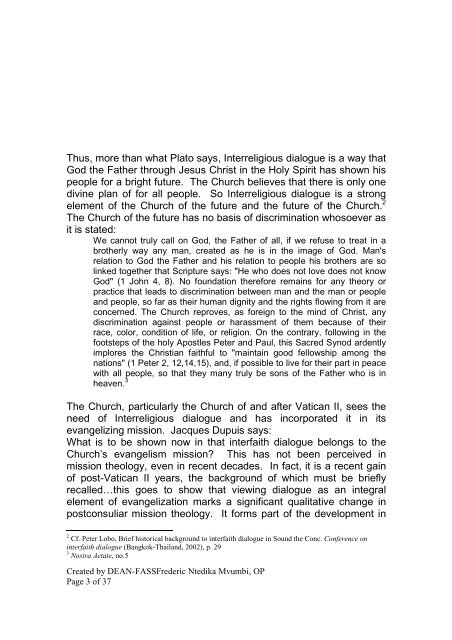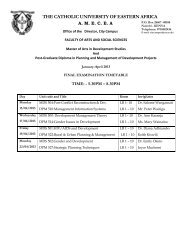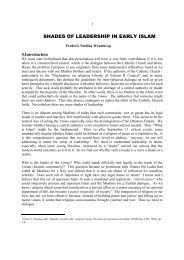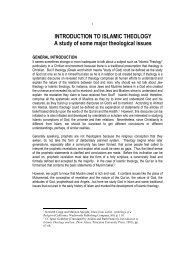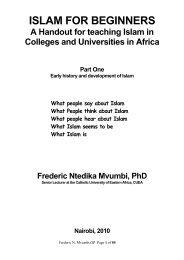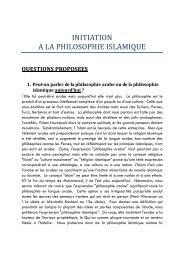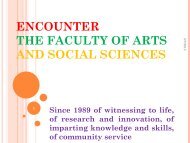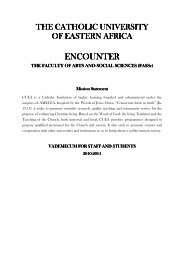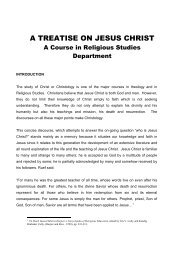PRINCIPLES FOR INTERRELIGIOUS DIALOGUE.pdf - CUEA
PRINCIPLES FOR INTERRELIGIOUS DIALOGUE.pdf - CUEA
PRINCIPLES FOR INTERRELIGIOUS DIALOGUE.pdf - CUEA
You also want an ePaper? Increase the reach of your titles
YUMPU automatically turns print PDFs into web optimized ePapers that Google loves.
Thus, more than what Plato says, Interreligious dialogue is a way that<br />
God the Father through Jesus Christ in the Holy Spirit has shown his<br />
people for a bright future. The Church believes that there is only one<br />
divine plan of for all people. So Interreligious dialogue is a strong<br />
element of the Church of the future and the future of the Church. 2<br />
The Church of the future has no basis of discrimination whosoever as<br />
it is stated:<br />
We cannot truly call on God, the Father of all, if we refuse to treat in a<br />
brotherly way any man, created as he is in the image of God. Man's<br />
relation to God the Father and his relation to people his brothers are so<br />
linked together that Scripture says: "He who does not love does not know<br />
God" (1 John 4, 8). No foundation therefore remains for any theory or<br />
practice that leads to discrimination between man and the man or people<br />
and people, so far as their human dignity and the rights flowing from it are<br />
concerned. The Church reproves, as foreign to the mind of Christ, any<br />
discrimination against people or harassment of them because of their<br />
race, color, condition of life, or religion. On the contrary, following in the<br />
footsteps of the holy Apostles Peter and Paul, this Sacred Synod ardently<br />
implores the Christian faithful to "maintain good fellowship among the<br />
nations" (1 Peter 2, 12,14,15), and, if possible to live for their part in peace<br />
with all people, so that they many truly be sons of the Father who is in<br />
heaven. 3<br />
The Church, particularly the Church of and after Vatican II, sees the<br />
need of Interreligious dialogue and has incorporated it in its<br />
evangelizing mission. Jacques Dupuis says:<br />
What is to be shown now in that interfaith dialogue belongs to the<br />
Church’s evangelism mission? This has not been perceived in<br />
mission theology, even in recent decades. In fact, it is a recent gain<br />
of post-Vatican II years, the background of which must be briefly<br />
recalled…this goes to show that viewing dialogue as an integral<br />
element of evangelization marks a significant qualitative change in<br />
postconsuliar mission theology. It forms part of the development in<br />
2 Cf. Peter Lobo, Brief historical background to interfaith dialogue in Sound the Conc. Conference on<br />
interfaith dialogue (Bangkok-Thailand, 2002), p. 29<br />
3 Nostra Aetate, no.5<br />
Created by DEAN-FASSFrederic Ntedika Mvumbi, OP<br />
Page 3 of 37


